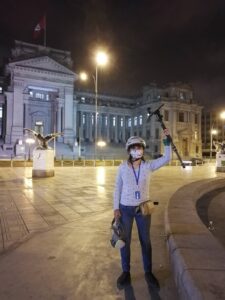Once Colombian journalists Catalina Ruiz-Navarro and Matilde de los Milagros Londoño had published the investigation "Eight allegations of sexual harassment and abuse against Ciro Guerra," their judicial harassment began. That was in June 2020. Among other actions, the famous Colombian filmmaker filed a tutela [a resource in the Colombian justice system to restore fundamental rights] to have the article taken down, but later the Colombian Constitutional Court ruled against him. On the other hand, Peruvian journalist Graciela Tiburcio Loayza published a feature story with five allegations of sexual harassment against former congressional candidate Víctor Quijada. To date, the politician has filed eight complaints for defamation and other crimes against Tiburcio. Both journalists claim that judicial harassment is a tool that is increasingly used in the region to silence journalism, and that it has had a severe impact on their personal and professional lives.
Ciro Guerra is a multi-award winning film director. His film "El abrazo de la serpiente [Embrace of the serpent]" was nominated for an Oscar in 2016 for Best Foreign Film. The filmmaker is one of the most recognized representatives of Colombian cinema to the world, and a very influential person in the audiovisual scene.

Catalina Ruiz-Navarro, Colombian journalist, co-founder of Volcánicas magazine and co-author of the feature story "Eight allegations of abuse and sexual harassment against Ciro Guerra." (Credit: Victoria Holguín)
Journalists Ruiz-Navarro and Londoño are the founders of Revista Volcánicas, where the investigation accusing Guerra was published. Founded in 2020, Revista Volcánicas is an independent digital news outlet with a feminist approach. As they state on their website, they help to "deconstruct machismo, and to advance the attainment of rights of women and LGBTQ+ communities."
The investigation lasted five months, during which they collected eight testimonies of alleged sexual abuse and systematic harassment by Guerra against younger women. Some of these women were even taking their first steps in the audiovisual world. Then they added a case of sexual violence, for a total of nine. The incidents happened between 2013 and 2019, and the victims requested not to have their identities revealed. None of the complaints were criminally prosecuted.
In the publication, the journalists state that they carried out a "verification process, complying with the highest journalistic standards." Thus, they corroborated the times, ways, places, and circumstances of the testimonies through screenshots of chats between the victims and Guerra, among others. They also resorted to auxiliary testimonies that verified the victims' statements. Finally, they offered space to the accused to give his version of the incidents and published their answers.
Because Ciro Guerra has a predominant influence in Colombian culture, the journalists state in the article that these facts are of "public interest." In addition, it was a series of abuses of power and "all the aggressions are part of a public health problem, such as gender violence."
Once their investigation was published, Guerra filed a tutela in late 2020 against the journalists and Revista Volcanicas for violating his rights to honor and good name, and his presumption of innocence. This way, he meant to force them to withdraw the article, but in February 2023 the Colombian Constitutional Court ruled against him. In addition, the director filed a criminal complaint and a civil lawsuit demanding one million dollars.
In their ruling, the highest court of Colombian justice defined "escrache" as a public condemnation of gender violence that "allows women victims to amplify their voices." It emphasized the possibility of keeping their identities anonymous so as not to expose themselves, and differentiated it from feminist journalism. It denied the tutela filed by Guerra on the grounds that the Volcanicas feature story conformed to "the constitutional standards of journalism."
"Victims of sexual violence have to have at their disposal different tools to achieve redress and one of those tools can be journalism. It is totally elitist and punitive to think that the only way to obtain justice is through legal processes, and particularly criminal processes," Ruiz-Navarro told LatAm Journalism Review (LJR).
The journalist said that, according to the ruling of the Constitutional Court, "the denunciation of sexual violence is specially protected speech and has a preventive function regarding gender violence." The Constitutional Court upheld this statement, denying Guerra's tutela and protecting feminist journalism from judicial harassment.
"Social media reporting has a very important effect on how we discuss these crimes in our society, and how we understand what becomes socially acceptable and what does not," Ruiz-Navarro said. "This social change is very important, otherwise the laws are of no use to us. The police and the entire judicial system is permeated by sexist ideas that legitimize violence, and this way we are not going to achieve justice."
For this reason, the journalist is emphatic about the role of journalism in this regard: "Journalism has a debt with women's rights, it’s very important for these denunciations to be there.”
On reparations for victims of sexual violence, "most decide to speak out when they realize there are more victims, that this person is doing it to others," Ruiz-Navarro said. "Many victims don't want their aggressors to go to jail, that's not what's going to make them feel redressed. In fact, they want to say out loud what happened to them for it to have a preventive effect, so it doesn't happen to others."
Judicial harassment is the "abusive exercise of the right to the administration of justice," explained the Colombian Constitutional Court in its ruling in favor of Volcánicas. And they added those elements that proved it, such as "the imbalance of power between the parties," or that Guerra has resorted to "several judicial and extrajudicial scenarios to request rectification and compensation that are impossible for the plaintiffs to pay."
"If you get sued and you don't have access to defense, you have to take down the article because otherwise you're going to bankrupt your family," Ruiz-Navarro said. For her, judicial harassment is a tool of persecution that is increasingly used against journalists because it is legitimate and very efficient.

Graciela Tiburcio Loayza, Peruvian journalist, published a feature stories with allegations of sexual harassment and abuse against former Peruvian congressional candidate Víctor Quijada. (Courtesy: Dayanna Delgado)
Peruvian journalist Graciela Tiburcio Loayza has been experiencing the same situation of persecution for the past two years. In 2021, she was working for the independent news outlet Wayka, when she received in her mailbox five testimonies of young women, between 20 and 21 years old, denouncing alleged sexual harassment by lawyer and politician Víctor Quijada.
The alleged harassment took place years earlier when they were attending school and were 15 years old. The young women said that Quijada sent them messages through social media and tried to put pressure on them win them over with alcohol and money to meet them in his office, Tiburcio told LJR. In the 2021 General Elections, the politician ran for Congress for the Peruvian Nationalist Party in Lima. That's when the young women decided to go public with their testimonies.
"The girls did not think it was appropriate that a guy who harassed teenagers at that time was now running for Congress, especially because they saw that he was trying to promote some topics related to women's rights," Tiburcio said.
The journalist backed up the victims' testimonies with screenshots of conversations with Quijada on social media. At the same time, she added two police reports that had been filed against him by 19 and 18 year old women in 2020 and 2017, respectively. Both complaints were closed because the complainants did not continue with the process. The crimes Quijada was charged with were blackmail and sexual harassment. In this case, the identity of the victims was also withheld.
Tiburcio contacted the defendant to get his version of the incidents. Quijada not only denied the crimes for which he was accused, but also threatened her: "He told me to think about my future because a complaint could bury my career. Then he called the co-director of Wayka to insist that she control me, that we dare not publish."
On the night of Feb. 25, 2021, the day the investigation was published, Quijada filed the first of eight complaints against Tiburcio and Wayka's co-director, Luciana Távara. The first was for "aggravated defamation," but it was followed by the crimes of "violation of privacy, illegal exercise of journalism, cybercrime, fraud, use of improper computerized data, and identity theft, among others."
According to the journalist, there are more than ten crimes consigned in eight complaints filed by Quijada against Tiburcio and Távara. "All of them are outlandish crimes and he is filing them in different police stations until one of them accepts them." Currently, of the total of the complaints, three were closed, two of them Tiburcio has no information about their status, and three others are in "preliminary investigation."
In addition to the complaints in police stations, the journalist received death threats against her and her family from anonymous accounts, and calls from Quijada in the early hours of the morning from different cell phone numbers. "I did not leave the house, I was scared, I had to have security cameras installed in my house using savings. At that time I was afraid for my parents because I lived with them. That's why I moved to another district. It affected me so much," Tiburcio said.
Although the journalist no longer receives threats on social media, she says that "it’s distressing not to know what will happen with the preliminary investigation processes against us." Although she no longer works at Wayka, she assures the news outlet has not supported her through this process: "I feel very unprotected by the news outlet to which I gave my love, respect and time for so many years. I’m hurt by the indifference they’re showing towards me."
When asked about this situation, Távara, from Wayka, said they have turned to human rights organizations such as the Instituto de Defensa Legal (Legal Defense Institute). With their support, they filed two criminal complaints against Quijada for the crimes of generic harassment and slanderous denunciation. The Public Prosecutor's Office opened investigations for both crimes.
--
Contributor Florencia Pagola is a freelance journalist from Uruguay. She does research and writes about human rights and freedom of speech in Latin America